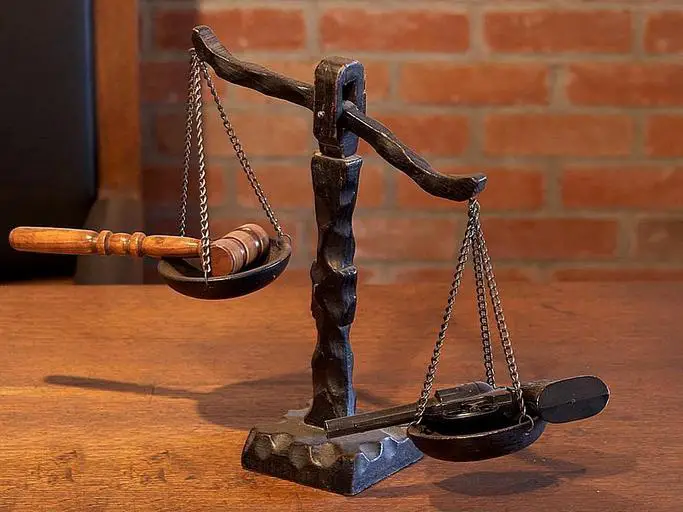Jury duty is an important civic responsibility for all citizens of the United States. It’s a serious obligation that requires you to take time off from your job, family and other obligations in order to serve on a jury panel. But what happens if you miss jury duty? Ignoring or not appearing for this vital civic function can result in serious legal repercussions including fines, court summons and even jail time depending on the state laws governing it. In this blog post we’ll explore everything there is to know about missing jury duty – from understanding why it matters and its consequences, how to avoid or postpone it as well as tips for preparing yourself when serving on a jury panel.
Table of Contents:
- What Is Jury Duty?
- Consequences of Missing Jury Duty
- How to Avoid or Postpone Jury Duty
- How to Reschedule Missed Jury Duty Appointments
- 5 Tips for Preparing for and Serving on a Jury Panel
- FAQs in Relation to What Happens If You Miss Jury Duty
- Conclusion
What Is Jury Duty?
Jury duty is a civic responsibility of citizens in the United States. It is an obligation that requires citizens to serve on a jury panel when summoned by their local court system. Jury duty allows for members of the community to be involved in making decisions about legal matters and provides them with an opportunity to ensure justice is served.
Definition of Jury Duty
Jury duty, also known as “jury service” or “petit jury service”, is defined as being part of a group (the jury) selected from among eligible citizens who are chosen at random and sworn under oath to listen to evidence presented during a trial and then render a verdict based upon what they have heard. The purpose of this process is for jurors to decide whether someone accused of breaking the law should be found guilty or not guilty.
Who Is Eligible For Jury Duty?
In order for someone to be eligible for jury duty, they must meet certain criteria set forth by their state government such as age requirements (18 years old), citizenship status (U.S.), residency within the county where summoned, no felony convictions, etc.. Additionally, some states may require potential jurors to fill out questionnaires prior to selection which can help determine if they are qualified or disqualified from serving on juries due their personal beliefs or biases towards certain topics related directly or indirectly with cases being tried before them.
What Is The Purpose Of Jury Duty?
The primary purpose of having people serve on juries is to ensure that those accused of crimes receive fair trials without bias from either side. This helps to ensure impartiality between both parties involved in litigation proceedings and serves as one way our judicial system works towards achieving justice through its own unique form of democracy – majority rule by peers rather than elected officials deciding outcomes based solely upon facts presented during trials held before them.
Jury duty is an important civic responsibility that all eligible citizens should take seriously. To learn more about What happens if you miss jury duty, continue reading below.
Key Takeaway: Jury duty is an important civic responsibility that requires citizens to serve on a jury panel when summoned by their local court system. In order to be eligible, individuals must meet certain criteria set forth by their state government and may need to fill out questionnaires prior to selection. The purpose of having people serve on juries is to ensure impartiality between both parties involved in litigation proceedings and help achieve justice through majority rule by peers.
Consequences of Missing Jury Duty
Missing jury duty is a serious offense that can have significant consequences. It is important to understand the potential legal and financial penalties for missing jury duty, as well as other possible repercussions.
Subheading A: Potential Legal Penalties for Missing Jury Duty
In some states, failure to appear for jury duty can result in criminal charges such as contempt of court or obstruction of justice. Depending on the jurisdiction, this could lead to fines or even jail time. Additionally, if you are summoned and fail to appear without an excuse from the court, you may be subject to civil penalties such as monetary fines or community service hours.
Subheading B: Financial Penalties for Missing Jury Duty
If you miss your scheduled jury duty appointment without notifying the court ahead of time, you may be required to pay a fine ranging from $100-$1,000 depending on where you live and how many times you have missed before. In addition to any imposed fines by the court system itself, employers may also impose their own sanctions against employees who miss work due to failing to show up for jury duty appointments. This could include docking wages or requiring unpaid leave days in order make up missed work hours while serving on a panel.
Subheading C: Other Consequences of Missing Jury Duty
Beyond potential legal action and financial costs associated with missing jury duty appointments there are other consequences that should be considered when deciding whether or not it’s worth skipping out on your civic responsibility obligations altogether. These include damage done reputationally both professionally and personally; difficulty getting credit applications approved; being denied certain government benefits; losing voting rights; loss of employment opportunities; decreased chances at obtaining housing loans; increased insurance premiums; having professional licenses revoked (if applicable); etc…
Overall, it is best practice both legally and ethically to take one’s obligation seriously when called upon to serve one’s country by participating in its judicial process. This includes attending all assigned dates and times related thereto unless excused beforehand by a judge.
Missing jury duty can have serious consequences, both legal and financial. Next, we will look at how to avoid missing jury duty in the first place.
Key Takeaway: Missing jury duty can have serious legal and financial consequences, including fines, jail time, loss of wages or employment opportunities, and even damage to one’s reputation. It is important to take this civic responsibility seriously by attending all assigned dates unless excused beforehand by a judge.
How to Avoid or Postpone Jury Duty
However, there are certain circumstances in which a person may be able to avoid or postpone jury duty.
Requesting an Excuse from Serving on a Jury Panel
In some cases, it may be possible to request an excuse from serving on a jury panel due to extenuating circumstances such as medical issues, work commitments, and other obligations. To do this, you must contact the court clerk or judge responsible for your summons and explain why you cannot serve at the time requested. The court will then review your request and determine whether or not they can grant you an excuse from service.
Requesting to Postpone Serving on a Jury Panel
If you are unable to obtain an excuse but still need more time before serving on a jury panel, it is possible to request that your service be postponed until another date. To do this, contact the court clerk or judge responsible for your summons and explain why you require additional time before appearing for jury duty. Depending on the reason given and how busy the courts are at any given moment, they may choose to grant your request for postponement of service until a later date which would be more convenient for both parties.
If you are unable to serve on a jury panel due to personal reasons, there are ways to request an excuse or postpone your service. Read on for more information about how you can make these requests and what will happen if they are denied.
“Don’t miss your jury duty date! If you need more time, you can always request a postponement. Just make sure to contact the court clerk or judge responsible for your summons first!” #juryduty #civicresponsibility Click To Tweet
How to Reschedule Missed Jury Duty Appointments
If you have missed a jury duty appointment, it is important to take the necessary steps to reschedule as soon as possible. Failing to do so can result in serious legal and financial consequences.
Contacting the Court Clerk or Juror Coordinator
The first step in rescheduling your missed jury duty appointment is contacting the court clerk or juror coordinator. You should contact them by phone, email, or mail as soon as possible after missing your original appointment date. When you call, make sure that you provide all of your personal information including name, address, and birthdate so they can verify who you are. The court clerk will then be able to give you instructions on how to proceed with scheduling a new date for your jury duty service.
Rescheduling Your Missed Appointment
Once the court has been contacted about your missed appointment, they will likely ask for proof that you were unable to attend on the originally scheduled day such as a doctor’s note or other documentation showing why you could not appear at that time. If this documentation is provided and accepted by the court staff then they may allow for an alternate date for serving on a jury panel without any additional penalties being imposed upon yourself. However, if no proof of inability was provided then there may be fines associated with failing to show up when initially summoned which must be paid before another jury duty service can be requested from the courts system again in future years.
If you’ve missed your jury duty appointment, contact the court clerk or juror coordinator as soon as possible to reschedule. Now let’s look at what happens if you fail to show up for a scheduled jury duty appointment.
Key Takeaway: Missing jury duty can result in serious legal and financial consequences, so it is important to contact the court clerk or juror coordinator as soon as possible after missing your appointment. The court may require proof of inability to attend on the original date, such as a doctor’s note, and if accepted they may allow for an alternate date without any additional penalties. If no proof is provided then fines may be imposed before another jury duty service can be requested again in future years.
5 Tips for Preparing for and Serving on a Jury Panel
Serving on a jury panel is an important civic duty and it’s essential to be prepared for the experience. Researching the case beforehand can help jurors understand what they will be hearing in court, so they can make informed decisions. It’s also important to understand your role as a juror, which is to evaluate evidence presented by both sides of the case and reach a verdict based on that evidence alone. Finally, following courtroom etiquette will ensure that everyone involved has an efficient and respectful experience during trial proceedings.
Researching the Case Beforehand: Doing research before serving on a jury panel helps jurors become familiar with the facts of the case before entering into deliberations with other members of their jury pool. This includes reading through any documents or materials provided by either side prior to trial day, such as witness statements or police reports. Jurors should also take time to read up on relevant laws related to the case at hand if possible.
Understanding Your Role as a Juror: As part of their service, jurors are expected to listen carefully during testimony from witnesses and attorneys representing each side in order to form an opinion about who is telling truth and who isn’t based solely upon this information – not personal biases or preconceived notions about either party involved in litigation process. Additionally, when deliberating with fellow jurors after all testimony has been heard, it’s important for individuals within group remain open-minded while considering different perspectives being shared by others present in room before coming up with final decision regarding guilt/innocence defendant(s).
It is essential for all participants, including those observing, to adhere to certain rules during trial proceedings in order to maintain respect among the parties involved in the legal dispute resolution process. This includes refraining from speaking out loud unless called upon by the judge presiding over the matter at hand and avoiding disruptive behavior such as eating or drinking inside of the courtroom (unless specifically allowed). Additionally, proper attire must be worn in order to enter courthouse premises; this typically means no shorts, t-shirts, tank tops etc., but rather dress slacks and a collared shirt with appropriate footwear (no sandals or flip flops etc.).
It is important to understand the responsibilities of a juror and to be prepared for your service on a jury panel. This will ensure that you have an enjoyable experience while performing your civic duty. Next, we’ll look at what happens if you miss jury duty.

Key Takeaway: Serving on a jury is an important civic duty and requires preparation, understanding of one’s role as a juror, and adherence to courtroom etiquette. Jurors should research the case beforehand, be open-minded when deliberating with other jurors, and follow proper dress code for entering the courthouse premises.
FAQs in Relation to What Happens If You Miss Jury Duty
What is the best excuse to miss jury duty?
The best excuse to miss jury duty is to provide proof of an unavoidable conflict. This could include a doctor’s note, proof of travel plans, or evidence that you are the primary caretaker for someone who needs your assistance. It is important to be honest and explain why you cannot serve on the jury. Depending on the court’s discretion, they may accept your explanation and allow you to reschedule for another time or waive your obligation altogether. However, if the court finds your excuse to be insufficient or untrue, you may face legal consequences.
What is the consequence for skipping jury duty?
Skipping jury duty is a serious offense and can have significant consequences. Depending on the jurisdiction, it may be considered contempt of court and punishable by fines, jail time or both. In some cases, failure to appear for jury duty can result in an arrest warrant being issued. Additionally, employers may take disciplinary action against employees who fail to comply with their civic responsibility of serving on a jury. It is important to contact the court if you are unable to attend your scheduled service so that alternative arrangements can be made.
What happens if you ignore a jury summons in Colorado?
Ignoring a jury summons in Colorado is not recommended. Doing so can result in serious consequences, including fines and even jail time. If you fail to appear for jury duty without an acceptable excuse, the court may issue a bench warrant for your arrest. Additionally, if you are found guilty of contempt of court, the judge may impose fines up to $750 or sentence you to jail for up to six months. It is best to contact the court as soon as possible if you cannot make it on your scheduled date and explain why you need an excused absence from jury duty.
What disqualifies you from jury duty in Colorado?
In Colorado, a person may be disqualified from jury duty if they are not a United States citizen, are under 18 years of age, have been convicted of a felony and not had their civil rights restored, or do not reside in the county where the court is located. Additionally, people who cannot read or understand English well enough to serve on a jury may also be disqualified. Lastly, individuals who have served as jurors within the past 12 months may also be excused from service.
Conclusion
If you miss your jury duty appointment, it is important to contact the court as soon as possible in order to reschedule or explain why you were unable to attend. Depending on the state and local laws, missing jury duty can result in fines, arrest warrants, or other legal consequences. Knowing what happens if you miss jury duty can help you make an informed decision about whether or not to appear for your scheduled appointment.
Do you know what happens if you miss jury duty? It’s important to understand your civic responsibility and the consequences of not fulfilling it. InterestingFacts.org is here to provide answers! We’ll give you all the facts, from the legal ramifications to other interesting tidbits about how different states handle missed jury service. Check us out for more information on this topic – knowledge is power, so let’s arm ourselves with awareness!



